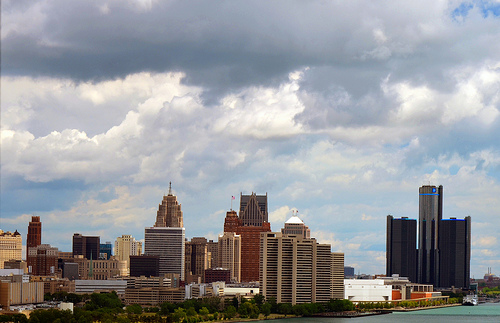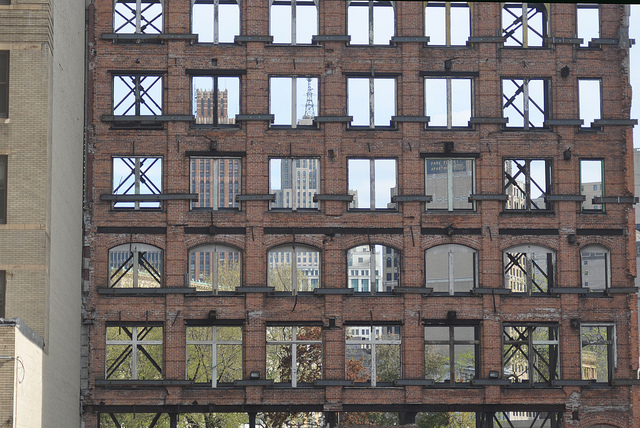| « America's #1 Populist Tips His Hat to Illinois' Campaign Finance Reform Movement | Chicago is Not a Monarchy » |
Urban Planning Fri Jul 26 2013
Detroit's Not Dead. It's Not Even Detroit.
 Detroit Skyline. Photo by nic_r
Detroit Skyline. Photo by nic_r
It's been a busy week for Detroit. As the city itself continues to chug along, all Dan Gilbert-gilded glory or 58 minutes-plus of waiting time for the cops to come, the world's been chiming in on what went so utterly wrong up in Motown.
Detroit, once powerhouse of industrial might and paradigm of American ideals and grandeur, has finally fallen from grace: a victim of poor governance, racism, lack of economic diversification, empty pension coffers, and sprawl. And America, beware. While amplified in Detroit, the same underlying dynamics that so rotted the Motor City are coming to a city near you.
This is to read the obituaries.
And yet, things are getting better all the time in Detroit. Declare bankruptcy one day and announce some green shoots in the economy the next. A $60 million mixed-use development is in the works. There's a placemaking renaissance afoot turning traffic islands into temporary beaches and creating last change. Here come the Red Wings. Let's not forget, Whole Foods just opened up in downtown Detroit.
This is to read the news.
To paraphrase a song from one of the city's most successful rappers, will the real Detroit please stand up?
As in any city, all of the above factors - both negative and positive - contain elements of truth. No place can ever be complete, and Detroit is no exception, simultaneously all 60,000 vacant parcels and home to an expanding creative class. Detroit is bankrupt, but the same could be said for Buffalo, Los Angeles, Pittsburgh, Chicago, or well, take your pick.
The power of Detroit's insolvency and its move toward bankruptcy resonates for a variety of reasons though. One is simply the massive scale of the city, and how its current situation upends the long-held American notion of growth equaling growth. The other is the city's long, precipitous decline coinciding with larger macro socioeconomic trends that affect all of America. The increasing stratification of American society coupled with renewed emphasis (if not necessarily as played out by census numbers, at least in cultural focus) on urbanity makes Detroit real.
For the same reason that "ruin porn" became a cultural touchstone during the height of the recession - after all, in good times, the slow slide of Detroit was largely left out of view - Detroit's municipal public panic is now, well, a public panic, if only because the present saga of Detroit allows society-at-large to use the city as a sounding board.
 American Ruins in Detroit. Photo by Ian Ransley
American Ruins in Detroit. Photo by Ian Ransley
In a rather misleading article that seems to encapsulate much of the fear and confusion over what Detroit means for other cities, the Chicago Tribune's Phil Rosenthal writes, "we can spend all day highlighting the differences between the two cities, but we're also spending more than we should. To blithely ignore the warning signs of what happened in the Motor City is as dangerous as thinking you can blow past the flashing lights at a railroad crossing." Rosenthal is correct in highlighting Chicago's pension deficiencies, but he fails to mention that for many in Chicago, now is a booming age almost like none other. In a renewed age of urban bifurcation, a city like Chicago has just large enough of a global class to keep it afloat, whereas Detroit simply doesn't have as large of such a class within its physical borders to offset the costs of extending services to neighborhoods disconnected from the physical and economic core.
A few years ago, while visiting Pittsburgh, I posited on this site that much of the perceived renewal and vitality felt within that city was due to a well-thought out and concerted effort to fail on institutional failures and invest in the intact attributes of a given place. Or as Jim Russell of Burgh Diaspora and Pacific Standard Magazine (who offers some of the more nuanced and insightful analysis on Detroit's recent situation) succinctly wrapped up my own views, to "Do the Fail." Pittsburgh could be a model for the nation by harnessing failure as "a paradoxical assertion of American greatness."
But Detroit never did the fail. While some may view bankruptcy as the ultimate failure, it is not a strategy of failure, as much as it's a condition of being unable to perform the same policy tricks to somehow come up with new ideas and strategies that build - i.e., subsidize - one's way out of obligations.
Obligations and legacy costs such as Detroit's $3B in unfunded pensions are killers when no one wants to honor and appreciate their own legacy. Detroit would rather not. So it declares bankruptcy as the future beckons brightly.
 St. Agnes Church, Detroit. Photo by memories_by_mike
St. Agnes Church, Detroit. Photo by memories_by_mike
The main takeaway from the Detroit experience, already underway at virtually every level of government, is using the threat of financial implosion as a means of softening the overriding structure and protections of the state, wherein the private person becomes an individualized economic unit. Meanwhile the governing body - on whatever level it may be - looks for cash in private sector pockets for public works. And in our collective vulnerability as generalized others, unsure of how this all works and being "together, alone," Detroit's problem becomes our problem.
This isn't even a story about Detroit.
Given the underlying racial dynamics that have indeed played a dramatic part in the story of Detroit and the story of America, it's hard not to hear Ellison's invisible man, who could just as easily be asking now, for/as Detroit, to a fearful nation, "Who knows but that, on the lower frequencies, I speak for you?"











